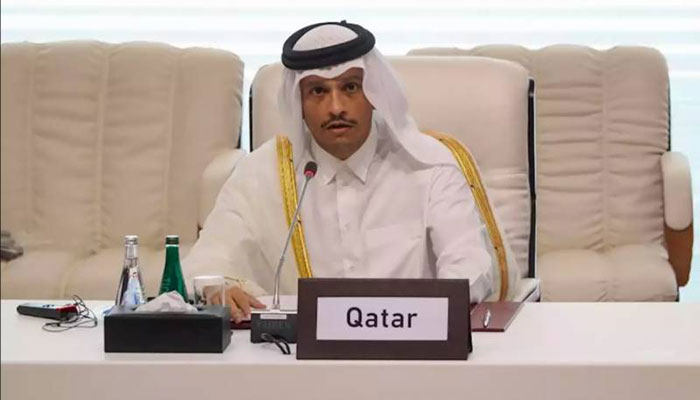Qatar signals progress to resolve Gulf crisis
DOHA: Qatar said on Friday there had been "some movements" towards resolving the Gulf crisis which has pitted a regional group of nations against Doha.
Kuwait’s Foreign Minister Sheikh Ahmed Nasser al-Mohammed Al-Sabah, who is leading mediation efforts, later said that all sides had expressed keenness for a "final agreement" during recent "fruitful discussions" which have included the United States.
Saudi Arabia led its allies -- the United Arab Emirates, Bahrain and Egypt -- to cut ties with Qatar in 2017, accusing it of backing radical Islamist movements and Iran, charges Doha denies.
They subsequently forced out Qataris residing in their countries, closed their airspace to Qatari aircraft and sealed their borders and ports, separating some mixed-nationality families.
"We have achieved certain progress at a certain point of time more than a year ago, and then things have slowed," Qatar’s Foreign Minister Sheikh Mohammed bin Abdulrahman Al-Thani said at the Mediterranean Dialogues forum in Rome.
"Right now, there are some movements that we hope will put an end (to) this crisis," he said, without giving details.
"We believe that Gulf unity is very important for the security of the region. This needless crisis needs to end based on mutual respect."
US President Donald Trump’s son-in-law and senior adviser, Jared Kushner, is reported to have raised the Gulf crisis and pushed for progress towards ending the spat during a visit to Qatar on Wednesday.
Few details have been made public about Kushner’s trip, which could have been his last chance to press diplomatic issues in the region that has been a focal point for the outgoing Trump administration.
In a brief address on Kuwait television, Sheikh Ahmed said "we express our appreciation" for Kushner’s efforts to break the stalemate. His Qatari counterpart thanked both Kuwait and Washington.
"We express our gratitude to the State of Kuwait for their mediation & the United States for their efforts," Sheikh Mohammed tweeted.
Saudi Arabia’s closure of its airspace has forced Qatar Airways to fly over Iran, Riyadh’s arch-rival and long-time adversary of Washington, paying significant overflight fees to Tehran in the process.
The New York Times has reported that Qatar pays $100 million annually to fly over the Islamic republic, citing diplomatic sources.
US national security adviser Robert O’Brien said in November that allowing Qatari planes to fly over Saudi Arabia via an "air bridge" was a priority for the outgoing Trump administration. In return, Qatar could agree to tone down the coverage of Saudi Arabia by its media, including Al Jazeera, according to an analyst, who declined to be named due to the issue’s sensitivity.
Qatar has repeatedly said it is open to talks without preconditions, though Doha has not signalled publicly it would compromise on the 13 demands of the boycotting countries.
"We know that the Trump administration has been working on disentangling the Qatar crisis, to create a more united front against Iran, or prevent Iran from trying to attract Qatari support," said Cinzia Bianco, a research fellow at the European Council for International Relations.
The White House has ramped up its rhetoric against Iran as the Trump presidency draws to a close.
Decades old US-Iranian tensions dramatically escalated after Trump walked out of an international deal to rein in Tehran’s nuclear programme in 2018.
US officials have said they hope President-elect Joe Biden will keep up Trump’s policy of "maximum pressure" after he takes office in January. Past mediation efforts to broker reconciliation between key US ally Qatar and its rivals have proved fruitless after apparent progress.
-
 Prince William, Kate Middleton Private Time At Posh French Location Laid Bare
Prince William, Kate Middleton Private Time At Posh French Location Laid Bare -
 Stefon Diggs Family Explained: How Many Children The Patriots Star Has And With Whom
Stefon Diggs Family Explained: How Many Children The Patriots Star Has And With Whom -
 Shamed Andrew ‘mental State’ Under Scrutiny Amid Difficult Time
Shamed Andrew ‘mental State’ Under Scrutiny Amid Difficult Time -
 ‘Narcissist’ Andrew Still Feels ‘invincible’ After Exile
‘Narcissist’ Andrew Still Feels ‘invincible’ After Exile -
 Bad Bunny's Super Bowl Halftime Show: What Time Will He Perform Tonight?
Bad Bunny's Super Bowl Halftime Show: What Time Will He Perform Tonight? -
 Where Is Super Bowl 2026 Taking Place? Everything To Know About The NFL Showdown
Where Is Super Bowl 2026 Taking Place? Everything To Know About The NFL Showdown -
 Chris Pratt Explains Why He And Katherine Schwarzenegger Did Premarital Counseling
Chris Pratt Explains Why He And Katherine Schwarzenegger Did Premarital Counseling -
 Drake 'turns Down' Chance To Hit Back At Kendrick Lamar At Super Bowl
Drake 'turns Down' Chance To Hit Back At Kendrick Lamar At Super Bowl -
 Sarah Ferguson Had A ‘psychosexual Network’ With Jeffrey Epstein
Sarah Ferguson Had A ‘psychosexual Network’ With Jeffrey Epstein -
 Miranda Kerr Shares The One Wellness Practice She Does With Her Kids
Miranda Kerr Shares The One Wellness Practice She Does With Her Kids -
 Czech Republic Supports Social Media Ban For Under-15
Czech Republic Supports Social Media Ban For Under-15 -
 Khloe Kardashian Shares How She And Her Sisters Handle Money Between Themselves
Khloe Kardashian Shares How She And Her Sisters Handle Money Between Themselves -
 Prince William Ready To End 'shielding' Of ‘disgraced’ Andrew Amid Epstein Scandal
Prince William Ready To End 'shielding' Of ‘disgraced’ Andrew Amid Epstein Scandal -
 Chris Hemsworth Hailed By Halle Berry For Sweet Gesture
Chris Hemsworth Hailed By Halle Berry For Sweet Gesture -
 Blac Chyna Reveals Her New Approach To Love, Healing After Recent Heartbreak
Blac Chyna Reveals Her New Approach To Love, Healing After Recent Heartbreak -
 Royal Family's Approach To Deal With Andrew Finally Revealed
Royal Family's Approach To Deal With Andrew Finally Revealed




